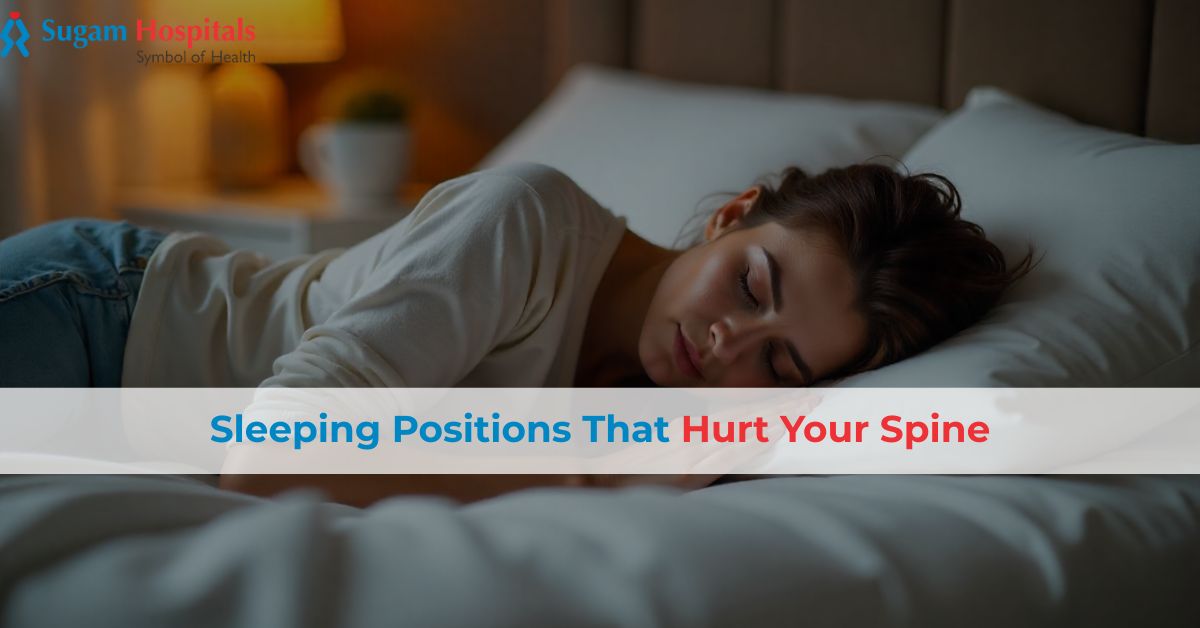Sleeping Positions That Hurt Your Spine

Sleeping Positions That Hurt Your Spine
September 17, 2025 by adminSleeping well does much more than refresh the brain; it directly affects the health of your spine. The way you lie in bed can protect or injure your back. Many people are unaware of postures they sleep in that are harmful to their spine, resulting in stiffness, discomfort or musculoskeletal injury in people on a long-term basis.
The best part of this knowledge is that if you are aware of how to sleep without causing strain on the spine, you can modify behaviors that have formed into habits and begin to eliminate discomfort.
Why Sleeping Posture Matters
Your spine has three natural curves: your neck, mid-back and low back. Together, these curves function to balance your body and provide stability and ease of movement.
Sleeping in positions that flatten or magnify these curves requires the muscles and ligaments to compensate for this imbalance. If you continue to sleep in a flattened or extended posture, you may wake up experiencing back pain, morning stiffness or increased pain in pre-existing spinal diagnoses.
The main effects of poor sleeping posture include:
- More tension on spinal discs
- Stiffness in the lower back and neck
- Worsening existing spine conditions
Stomach Sleeping: The Hidden Danger
Sleeping while facing downward is one of the most damaging rest positions for the spinal column. It compels the neck to remain rotated to one side, placing a strain on the cervical spine while the mid and lower back supports misallocation of weight.
Effects of stomach sleeping:
- Neck pain and stiffness due to continuous rotation
- Compression of the lower back leading to chronic pain
- Increased spinal misalignment over time
While some people find stomach sleeping comforting, staying in the stomach down position over time can worsen posture and create longer lasting discomfort.
Curled-Up Fetal Position: Is It Safe?
Most people curl up really tightly with their body on the side, also known as the fetal position. While it may be comfortable, this position can result in compression on your spinal discs and unnatural rounding of your spinal column.
Possible effects of fetal curling too tightly:
- Restricted alignment of the spine
- Morning stiffness in the back and hips
- Irritation to existing conditions, including herniated discs
Back Sleeping Without Support
Sleeping on your back can be a good option for spinal health, but lying flat on your back without any support can cause neck strain and lower back strain.
Tips for sleeping better on your back:
- Place a pillow under your knees to support your lower back.
- Make sure the pillow under your head keeps your neck aligned with your spine.
- Avoid sleeping totally flat on a soft mattress that sinks.
Side Sleeping: Mind Your Alignment
Sleeping on your side can be a better option for your spine, but only done in a certain way. Incorrect positioning of your hips, legs or neck could give rise to discomfort.
Below are some common mistakes when sleeping on your side:
- Not placing a pillow between your knees, which creates rotation of your hips,
- Using a very thin pillow, which creates bad alignment of your neck,
- Curling too tightly together, which compresses the spine.
With some small changes, such as putting a pillow between the knees, side sleepers will be able to keep their spine in good alignment and have less morning discomfort.
Ways to Sleep Pain-Free and Protect Your Spine
Although your preferred sleeping position may not be ideal, you can often make simple changes to relieve strain:
- Opt for a medium-support mattress that provides even support for your body
- Use a pillow that keeps your head, neck and shoulders aligned
- Use cushions to support your hips or knees depending on your position
- Slowly train yourself not to sleep on your stomach to encourage long-term benefit
Any change to your sleeping position, combined with stretching regularly, will help minimize stiffness and will protect your spine from long term issues.
If you feel ongoing discomfort, numbness or stiffness after sleeping, it may indicate a problem other than sleeping position. You may have medical conditions that would need an evaluation such as disc problems, arthritis or chronic strain or overuse injuries. At Sugam Hospital, our Orthopedic Doctor Chennai specializes treating your spine to give you electromyography directed treatment for your specific condition designed to improve motion and ease your pain.

